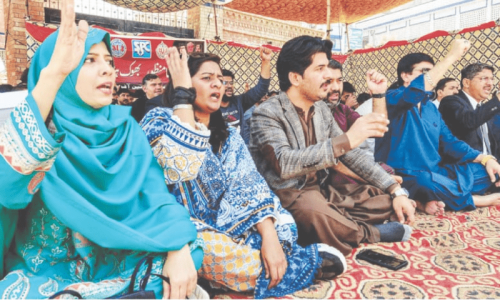MITHI, Jan 18: Speakers at a workshop for farmers on water conservation and development have suggested construction of small dams to store rainwater that goes waste in the Rann of Kutch after flowing through Karoonjhar mountains.
The workshop was organised by the Pakistan Council of Research in Water Resources (PCRWR), in collaboration with the United Nations Development Programme (UNDP).
The speakers said that the dams could meet water requirements of about 25,000 people in 65 villages.
Engineer Mohammad Khan Mari, director in-charge of Drainage Research Centre (DRC) Tandojam, said that Thar was not a barren desert. It was an arid region spread over 22,000 square kilometres, with 1.2 million population and about 4 million animals.
He said that a drought of medium intensity hit Thar every four years, and usually a severe drought every 10 years, dealing a deadly blow to its socio-economic fabric.
Mr Mari said that 85 per cent of the underground water in Thar was too brackish, unfit for drinking or agriculture, and the remaining 15 per cent was of two kinds, one unfit for use and the other not very advisable to drink. But with no alternative, Tharis were compelled to consume it and use for other purposes, he said.
He said that drought years created acute shortage of water and fodder, forcing thousands of families to migrate to other areas with cattle heads, of which 75 per cent perished. The remaining survived, becoming weak and on verge of death.
The droughts badly affected education of children of the poor and gave rise to various diseases, particularly among women and children, Mr Mari said.
He said that history bore testimony to the fact that a river, Saraswati, used to flow in the north-eastern area of Thar in ancient times, which gradually disappeared, leaving behind water channels and lakes containing huge quantity of sweet water.
Arbab Nek Mohammad, a columnist, said that more research should be done into water resources of Thar where coal had been discovered. He urged the government, NGOs and other stakeholders to devise a strategy to ensure supply of potable water in the remote and backward district of Tharparkar, where people had to walk miles to fetch water from distant wells.
Dr Abdul Majid, country manager of the UNDP, said that in comparison to Chulistan, the soil of Thar was fertile covered with trees and bushes. Credit went to local people for protecting trees and pastures through Panchayat system, he said.
Absence of potable water was core issue for the desert’s populace, hence 500 “Tobhas”, tanks for storage of rainwater, had been constructed in Chulistan, where droughts had caused large-scale migration of inhabitants with cattle heads to greener pastures in search of survival.
The PCRWR chief Dr Mohammad Ashraf said that water was a blessing and gift from God. As the population of the world had increased alarmingly, the water resources had depleted and it had become a matter of grave concern for the nations of the world, who were stressing now that water should be used under comprehensive useful planning.















































Dear visitor, the comments section is undergoing an overhaul and will return soon.